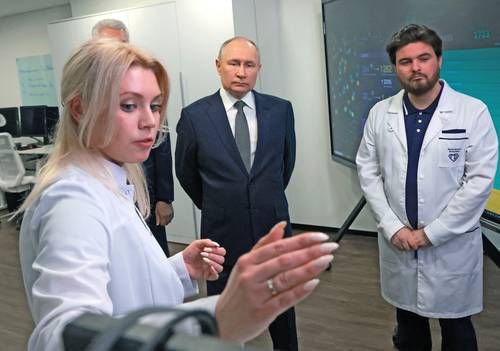Moscow. Russia is close to starting to produce a so-called cancer vaccine and new generation immunomodulatory drugs, which I am confident will soon be able to be effectively used as methods of individual therapy
President Vladimir Putin announced this week at a recent forum on new technologies.
The head of the Kremlin, in the middle of the campaign for his re-election in a month, did not offer details, but there is abundant information circulating that allows us to affirm that Russian science continues to advance in the search for solutions to this implacable disease that now affects this country, with figures from the Russian Ministry of Health, 4 million 500 thousand patients in different degrees of treatment and that each year takes the lives of many people in the world.
What Russia is close to producing – in the opinion of local experts on the subject, to name one, Yevgeny Cheriomushkin, a researcher at the Institute of Clinical Oncology of the Russian Academy of Medical Sciences -, It is not exactly a vaccine to prevent the disease from arising, but we have been trying to develop a drug for more than 10 years that, according to the results of the different phases of experimentation with volunteers, can be effective in the treatment of certain types of cancer
.
The oncologist Viacheslav Lisovoy thinks the same, who does not believe that “in a close perspective the ‘vaccines’ are going to relegate traditional methods of cancer treatment, but we can already assure that very soon we will have a cure option that will make it possible to stop the spread of metastases and, to that extent, prolong the lives of patients.”
Work of a decade
Sergei Leonov, deputy director of the laboratory of innovative medicines and agrotechnologies, one of the scientists who has dedicated his time since 2014 to trying to create a vaccine
against cancer, he noted: “we take – he explains in the supplement Science (4/26/23), from the newspaper Kommersant– samples of tumor tissue from a patient to force the cells to age through radiation and chemotherapy. Then, we graft those tissues into animals and watch how the tumor evolves. If its development is slowed down or stopped altogether, it gives us the possibility of testing it in cancer patients.”
And adds: But it is a completely personalized approach because we take the cells from a single patient, work with them and then graft them back to the patient. We have a lot of work ahead of us
.
A week before Putin’s announcement, academic Sergei Krasny, deputy director of the Center for Oncology and Medical Radiology of Belarus, announced at a press conference in Minsk that In 2024 we will begin manufacturing Elenagen, considered a vaccine against cancer, although conventionally called that, since it does not generate a prophylactic effect, but rather helps cure some types of cancer.
.
Elenagen, whose formula was created by molecular biologist Alexander Shneider, an American citizen born in Saint Petersburg, founder and current director of CureLab Oncology, Inc, began to be tested in Belarus in 2020, before the covid pandemic, and last year it gave results hopeful against certain types of tumors; in other cases, it had no effect on the dynamics of the disease; and in others, more tests still need to be carried out, according to Krasny.
And in April of last year, the Russian Ministry of Health registered the drug Kymriah, from the Swiss laboratory Novartis, which is used in 23 countries to treat acute lymphoblastic leukemia in patients between three and 25 years of age – Russia has about two thousand affected people who require this medication – and whose cost per complete course, assumed by the respective States, amounts to 475 thousand dollars (more or less, 8 million 100 thousand pesos at yesterday’s exchange rate).
